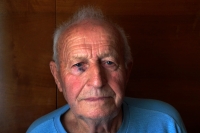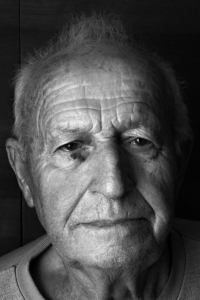Bombs were falling and women were praying the Lord’s Prayer

Download image
Bruno Mrovec was born on December 20, 1934 in Kobeřice in Hlučín area, Czechoslovakia. The parents were Catholics and belonged to the Moravians. He came from four children. His father Jan was a carpenter who went to work in Germany during the economic crisis. After the annexation of Hlučín area to the German Empire in 1938, he had to enlist in the Wehrmacht. Bruno well remembers the arrival of the front in Kobeřice in April 1945. The battles between the German army and the Red Army took place a few meters from their residence. The German soldiers in their house were replaced by Red Army men. After liberation, Hlučín once again became part of the restored Czechoslovakia. Bruno had to learn the Czech language, which he had forgotten during the war. He trained to be a bricklayer. He worked on construction sites all over Moravia. In 2021, he lived with his wife in Kobeřice.

